Filter by

Spatial-Temporal Evolution of Mining-Induced Rock Damage and Ground Control o…
This open access book presents the Coal remains the primary energy source in China, with an estimated total coal reserve of 59 trillion tons at depths of less than 2000 meters. Among these, over 50% lie at depths exceeding 1000 meters, primarily distributed in central and eastern China. Deep coal mining has become the new norm for the coal industry’s development and resource exploitation. To …
- Edition
- -
- ISBN/ISSN
- 978-981-96-5439-0
- Collation
- XIII, 235
- Series Title
- -
- Call Number
- -
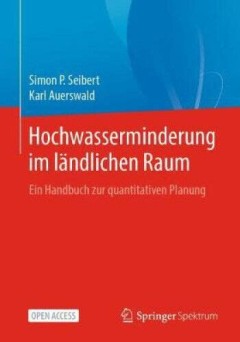
Hochwasserminderung im ländlichen Raum = Ein Handbuch zur quantitativen Planung
Diese Open-Access-Publikation ist ein anwendungsorientiertes Lehr- und Handbuch zur Abflussminderung im ländlichen Raum. Meteorologische Extreme wie Dürren, Starkregen und Überschwemmungen häufen sich wegen des Klimawandels. Gleichzeitig steigt der Druck auf unsere Landschaft kontinuierlich, indem sie immer intensiver genutzt und effizienter erschlossen wird. Durch diese Entwicklungen erge…
- Edition
- 1
- ISBN/ISSN
- 9783662610336
- Collation
- XI, 236 hlm; ill., lamp.,
- Series Title
- -
- Call Number
- -
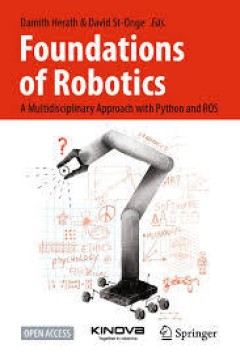
Foundations of Robotics
This chapter is an extensive overview of the history of automata and robotics from the Hellenistic period, which saw the birth of science and technology, and during which lived the founders of modern engineering, to today. Contemporary robotics is actually a very young field. It was preceded by a 2000-years period in which highly sophisticated automata were built for very different purposes…
- Edition
- -
- ISBN/ISSN
- 9789811919831
- Collation
- XXI, 543
- Series Title
- -
- Call Number
- -
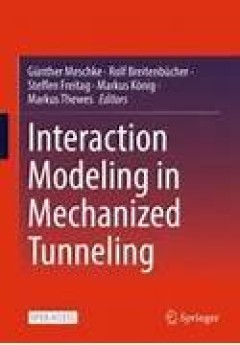
Interaction Modeling in Mechanized Tunneling
This open access book compiles the research results of the Collaborative Research Center SFB 837, which has been running since 2010 and will end in 2022, with the topic "Interaction Modeling in Mechanized Tunneling". The Collaborative Research Center is funded by the German Research Foundation (DFG) and is currently the world's largest research facility in the field of tunneling. The aim of the…
- Edition
- 1
- ISBN/ISSN
- 978-3-031-24065-2
- Collation
- XIX, 463
- Series Title
- -
- Call Number
- -

Inquisitive Logic: Consequence and Inference in the Realm of Questions
This open access book makes a case for extending logic beyond its traditional boundaries, to encompass not only statements but also also questions. The motivations for this extension are examined in detail. It is shown that important notions, including logical answerhood and dependency, emerge as facets of the fundamental notion of entailment once logic is extended to questions, and can therefo…
- Edition
- Volume 60
- ISBN/ISSN
- 978-3-031-09705-8
- Collation
- XX, 272
- Series Title
- -
- Call Number
- -
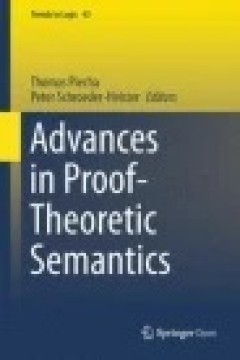
Advances in Proof-Theoretic Semantics
This volume is the first ever collection devoted to the field of proof-theoretic semantics. Contributions address topics including the systematics of introduction and elimination rules and proofs of normalization, the categorial characterization of deductions, the relation between Heyting's and Gentzen's approaches to meaning, knowability paradoxes, proof-theoretic foundations of set theory, Du…
- Edition
- Ed. 1
- ISBN/ISSN
- 978-3-319-22686-6
- Collation
- VI, 283
- Series Title
- Trends in Logic
- Call Number
- 511.3 ADV a

Foundations of Software Science and Computation Structures: 23rd Internationa…
This open access book constitutes the proceedings of the 23rd International Conference on Foundations of Software Science and Computational Structures, FOSSACS 2020, which took place in Dublin, Ireland, in April 2020, and was held as Part of the European Joint Conferences on Theory and Practice of Software, ETAPS 2020. The 31 regular papers presented in this volume were carefully reviewed and …
- Edition
- 1
- ISBN/ISSN
- 978-3-030-45231-5
- Collation
- XV, 644
- Series Title
- -
- Call Number
- -

Return to China One Day
This open access book is intended for common readers who are interested in the life story of Qian Xuesen (also know as Tsien Hsue-Shen). Based on a large number of original archives and historical materials, this book focuses on Qian Xuesen’s years of seeking knowledge from his birth in 1911 to his return to China in 1955 and describes how he grows into a world-known scientist from the aspect…
- Edition
- 1
- ISBN/ISSN
- -
- Collation
- -
- Series Title
- -
- Call Number
- XII, 190

Enrico Fermi the Obedient Genius
This biography explores the life and career of the Italian physicist Enrico Fermi, which is also the story of thirty years that transformed physics and forever changed our understanding of matter and the universe: nuclear physics and elementary particle physics were born, nuclear fission was discovered, the Manhattan Project was developed, the atomic bombs were dropped, and the era of “big sc…
- Edition
- -
- ISBN/ISSN
- 978-1-4939-3533-8
- Collation
- 51 b/w illustrations, 3 illustrations in colour
- Series Title
- -
- Call Number
- -
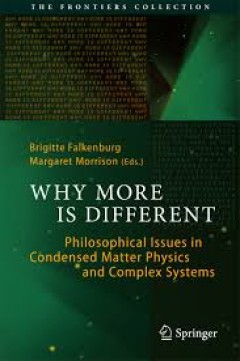
Why More Is Different Philosophical Issues in Condensed Matter Physics and C…
The physics of condensed matter, in contrast to quantum physics or cosmology, is not traditionally associated with deep philosophical questions. However, as science - largely thanks to more powerful computers - becomes capable of analysing and modelling ever more complex many-body systems, basic questions of philosophical relevance arise. Questions about the emergence of structure, the nature o…
- Edition
- -
- ISBN/ISSN
- 978-3-662-43911-1
- Collation
- -
- Series Title
- -
- Call Number
- -
 Computer Science, Information & General Works
Computer Science, Information & General Works  Philosophy & Psychology
Philosophy & Psychology  Religion
Religion  Social Sciences
Social Sciences  Language
Language  Pure Science
Pure Science  Applied Sciences
Applied Sciences  Art & Recreation
Art & Recreation  Literature
Literature  History & Geography
History & Geography